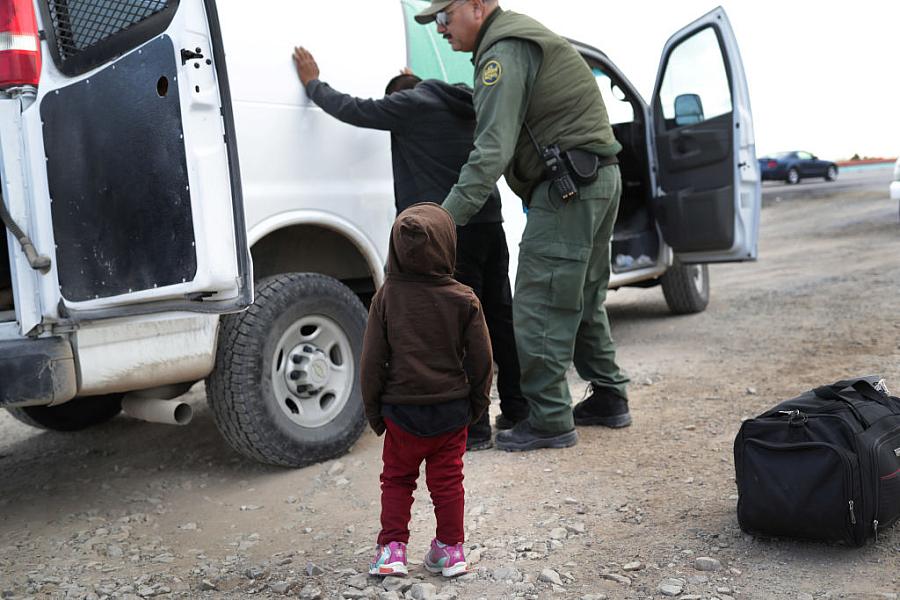Pediatricians warn of long-term harm for children detained at border

(Photo by John Moore/Getty Images)
Every day brings new details of the horrors that children are facing in detention centers at the U.S.-Mexico border. As women and mothers, we are astonished at the reported conditions. But as pediatricians with expertise in the well-being of babies and young children, we are deeply concerned about the long-term health impacts these detained children and their communities could be facing. While media coverage of this topic will ebb and flow, the effects on children will far outlast any news cycle.
At present, children in detention at the southern border are suffering from unsanitary and unsafe conditions. Lawyers, lawmakers, and pediatricians who have visited the facilities describe cramped spaces; insufficient food and inadequate nutrition; lack of access to showers and places to wash diapers, bottles and soiled clothing; and uncomfortable, cold and bright conditions that do not permit restful sleep. These children have insufficient access to medical care, and facilities lack pediatricians who have the expertise to recognize the particular signs and symptoms of acute childhood illness. At least six children have died of infection or causes related to unsafe conditions at these facilities.
Research shows that the individuals who are able to migrate to the U.S. tend to be healthier than native U.S. populations, and Central and South American children tend to have very high rates of vaccination. It is the squalid, cramped conditions that youth face upon arrival that breed illness. Without immediate action, we anticipate that more children will suffer or, far worse, perish in these facilities.
But the health risks go far beyond acute infections. In many cases, the conditions children are facing will have long-term consequences for their development, learning and overall well-being. Being detained in unsafe conditions, especially without a trusted caregiver, is a traumatic experience, and for many children seeking asylum in the U.S., this is certainly not their first exposure to trauma.
Persistent or repeated trauma is a condition known as toxic stress, which can affect a child’s fight-or-flight stress hormones, and in turn permanently change their brain chemistry and biology. In the short-term, children who experience toxic stress are more vulnerable to infection and in the long-run, they are at much higher risk of problems with learning, attention and behavior.
As pediatricians with expertise in the well-being of babies and young children, we are deeply concerned about the long-term health impacts these detained children and their communities could be facing.
For example, a recent systematic review found that early childhood exposure to adverse experiences, such as neglect or child abuse, is associated with lower cognitive scores, even after taking into account social and demographic factors. Another study that included more than 76,000 children found that children with attention deficit–hyperactivity disorder (ADHD) were more likely to have experienced adverse childhood experiences than children without ADHD, and that the severity of ADHD was worse among children with more adverse childhood experiences. Children who had experienced one adverse experience during childhood were 1.6 times more likely to be diagnosed with ADHD, and children who had experienced four or more instances of adversity were nearly four times more likely to have the disorder. In fact, the symptoms of ADHD and traumatic stress, including distractibility and impulsivity, overlap substantially, making it difficult to disentangle the role of toxic stress and ADHD symptoms.
Cumulative exposure to high levels of toxic stress in childhood are also correlated with higher rates of adult illnesses, such as cardiovascular disease, diabetes, cancer and depression. What’s more, adults who have been exposed to four or more adverse childhood experiences have twice as high a risk of early death as adults who did not experience such toxic stress in their childhood.
But it doesn’t always stop there. Trauma and toxic stress have even been shown to have intergenerational impacts. There is emerging science to suggest that the children of mothers who have been exposed to adverse childhood experiences are also at increased risk of poor health and developmental outcomes.
Having access to a nurturing parent or secure caregiver is key for combatting the effects of this toxic stress. Yet there are reports of ongoing separation occurring at our border. Children have also reported that they are not permitted to hug and comfort their siblings. Others have reported sexual assault and abuse. It is clear to us that the reported conditions that asylum-seeking children and their families are experiencing at the border and in detention facilities are depriving these children of one of the only buffers they might have against the long-term effects of toxic stress: the safe and consistent presence of a trusted caregiver. We are compounding psychological trauma with physical trauma, which can lead to deadly consequences.
As pediatricians, we are trained to recognize the acute and long-term health effects of immigration policy on children, but we recognize not all policymakers and immigration officials possess this expertise. In the short-term, we believe children should have unfettered access to pediatricians and child mental health specialists while we work out alternate solutions to child detention. The hiring process should prioritize health care providers trained in pediatric trauma-informed care and ensure that all physicians hired are board-certified. In addition, policies should require any facility that houses children to employ medical providers with these qualifications and allow clinicians to offer both preventative and acute care on a consistent basis. This is especially important for centers that house children long-term.
Finally, as our leaders debate immigration policies and distribute the $4.6 billion in funding that Congress recently allocated to address asylum-seekers at the border, policymakers should consult child health specialists to ensure that we regularly and systematically evaluate the effect of these policies on children. Anything less would jeopardize the mental and physical health of a generation of vulnerable immigrant children.
Dr. Kate Wallis is a developmental pediatrician at Children’s Hospital of Philadelphia (CHOP) and Dr. Diana Montoya-Williams is a neonatologist at CHOP. Both physicians are also researchers at CHOP’s PolicyLab.


